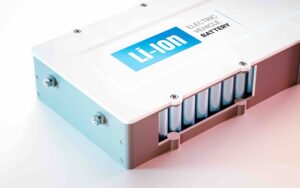APPLICATIONS OF TECHNOLOGY:
- Solid state batteries
- Electric Vehicles
BENEFITS:
- High ionic conductivity while maintaining a low electronic conductivity.
- Decreased dendrite formation and increased stability because of the composite’s reduced reactivity with air and electrode materials.
BACKGROUND:
Lithium ion batteries (LIBs) with solid electrolytes are of interest due to their high energy density, improved safety, and possible cost effectiveness compared to conventional LIBs. Despite the numerous advantages of solid state LIBs, some issues hindering commercialization include their low ionic conductivity compared to liquid electrolytes, reaction with moisture and Li metal, reduction during cycles, and mechanical strength.
Some researchers have turned to sulfide-based solid electrolytes such as Lithium Phosphorous Sulfur (LPS) based electrolytes because of their higher room temperature ionic conductivity than conventional LIBs. However, certain sulfide based electrolytes still exhibit strong reactivity with Li-metal, resulting in increased interfacial resistance and rapid growth of lithium dendrites.
TECHNOLOGY OVERVIEW:
One way to combat this without losing energy density is through sulfide-based solid electrolytes that include halides which have been shown to form a solid electrolyte interface layer to allow for lithium ion movement.
Researchers at Berkeley Lab have developed polymer/lithium phosphorus sulfur chloride (LPSCl) composite electrolytes for their use in solid state lithium-ion batteries. These include a reduced sensitivity to air, high ionic conductivity, and lower electronic conductivity compared to available technologies. The electrolytes were made via an in-situ polymerization of triethylene glycol dimethacrylate (TEGDMA) monomers and LPSCl ceramic precursors to enhance the interfacial reaction between the solid electrolyte and the electrodes. Tested composites exhibited high ionic conductivities. The electrolyte was also shown to have remarkable cycling stability over 1000 hours (375 cycles). In addition, the production of the electrolyte is highly scalable.
DEVELOPMENT STAGE:
Validation in laboratory
PRINCIPAL INVESTIGATORS:
Gao Liu
IP Status: Patent pending
Additional information:
ACS Appl. Energy Mater. 2024, 7, 5, 1842–1853. Publication Date: February 16, 2024. https://doi.org/10.1021/acsaem.3c02858
ACS Appl. Mater. Interfaces 2023, 15, 9, 11723–11730. Publication Date:February 24, 2023. https://doi.org/10.1021/acsami.2c21302
OPPORTUNITIES:
Available for licensing or collaborative research
